To maintain a balanced diet as a vegan, you need diverse protein sources. Quinoa is a powerhouse, boasting all essential amino acids. Pulses like beans, lentils, and chickpeas offer protein, fiber, and iron. Tofu, rich in protein and versatile in use, promotes heart health. Rice varieties, especially brown and wild rice, provide substantial protein. Green vegetables like spinach, broccoli, and Brussels sprouts contribute essential nutrients. Soy products such as edamame, tempeh, and tofu support muscle repair. Nutritional yeast adds a cheesy flavor and crucial B12. Explore these options to secure a well-rounded, nutrient-dense plant-based diet. Discovering more will enhance your nutrition journey.
Key Takeaways
- Quinoa is a complete protein containing all essential amino acids and is gluten-free.
- Pulses such as beans, lentils, and chickpeas are nutrient-dense and rich in protein and fiber.
- Tofu offers a versatile, protein-rich option with essential amino acids and heart health benefits.
- Oats provide a combination of protein, fiber, iron, and antioxidants for a balanced diet.
- Soy products like tempeh, tofu, and edamame are high in protein and essential amino acids.
Importance of Protein
Understanding the significance of protein is essential because it plays a fundamental role in maintaining your muscle, skin, and overall health. Think of protein as the superhero of nutrients, swooping in to save your immune system function, assist with blood sugar regulation, and boost energy production.
Without adequate protein intake, your body might feel like it's running on low battery. You need essential amino acids, which are the building blocks of protein, and guess what? Your body can't make nine of them on its own. They must come from your diet.
Along with these amino acids, protein packs a punch with B vitamins and minerals, ensuring your overall health stays in tip-top shape. So, keep your protein game strong!
Daily Protein Requirements
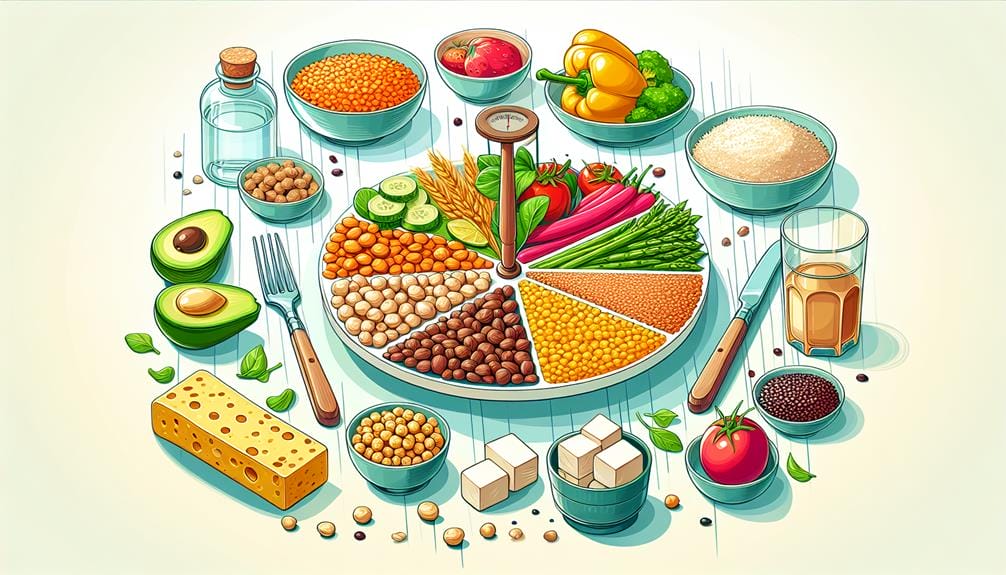
Understanding your daily protein requirements is essential for maintaining good health, especially on a vegan diet.
Adults typically need 0.75g of protein per kg of body weight each day, but this can vary based on factors like age and activity level.
To make sure you're meeting your needs, consider consulting a nutritionist for personalized advice.
Recommended Protein Intake
To maintain peak health, you generally need about 0.75g of protein per kilogram of body weight each day. That means if you weigh 60kg, you're looking at around 45 grams of protein per day to meet your adequate protein needs.
But hey, protein intake isn't a one-size-fits-all deal. Your protein needs can vary based on factors like age, sex, weight, and activity level. To hit the sweet spot, consult with a nutritionist for personalized protein intake. They're the pros at figuring out your recommended protein intake.
- Quick protein math lesson
- Tailored advice from a nutritionist
- Protein needs based on your lifestyle
- Keeping your health in top gear
Age-Specific Protein Needs
Knowing your general protein needs is a great start, but let's get into the nitty-gritty of how age affects your daily protein requirements. According to USDA guidelines, your protein intake varies with age. Kids need less, teens need more, and adults should aim for something in between.
Vegan and vegetarian protein sources like lentils, chickpeas, and tofu are excellent for meeting these age-specific protein needs. Whether you're a sprightly young vegan or a wise, plant-based elder, whole-food plant-based diets can deliver the necessary protein content.
Pregnant or breastfeeding? You might need a bit more daily protein. So, stock up on those plant-based proteins and keep an eye on your age-specific requirements to stay healthy and strong!
Quinoa
Quinoa is a powerhouse of nutrition, offering all nine essential amino acids in every bite. Not only is quinoa a complete protein, but it's also loaded with fiber, iron, and magnesium. Plus, it's gluten-free, making it perfect for those with gluten sensitivities.
Let's not forget, quinoa is a sustainable crop, so you can eat it with a clear conscience. Incorporate quinoa into salads, bowls, or as a side dish to elevate your meals.
- Complete Protein: Contains all nine essential amino acids.
- High in Fiber: Great for digestion and keeping you full.
- Rich in Iron and Magnesium: Boosts your energy and supports bone health.
- Gluten-Free: Safe for those with celiac disease or gluten intolerance.
Pulses
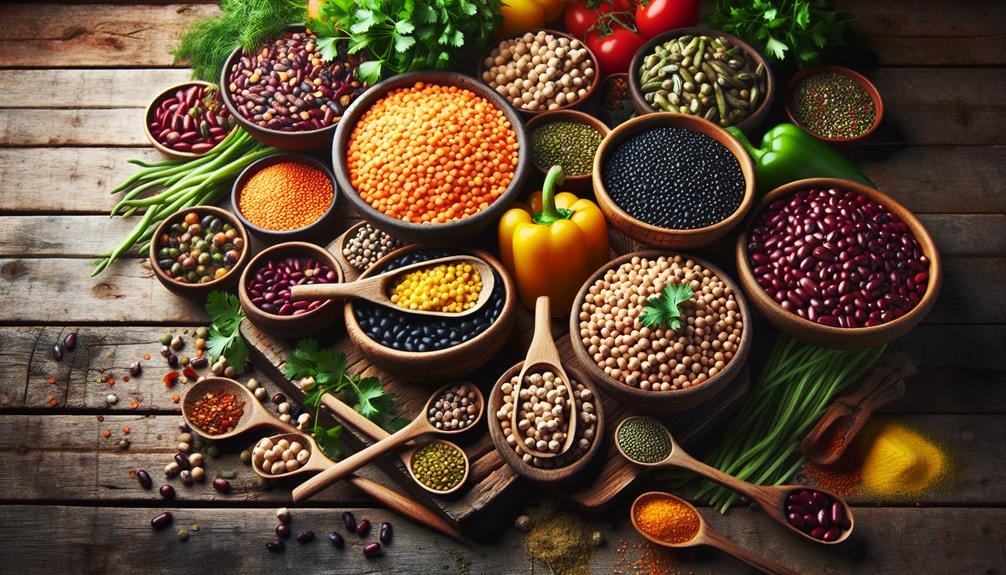
When considering vegan protein sources, pulses like beans, lentils, and chickpeas should be at the top of your list. These nutrient-dense legumes not only provide substantial protein but also deliver essential nutrients such as fiber and iron.
Adding a variety of pulses to your meals guarantees you meet your daily protein needs while enjoying the benefits of a plant-based diet.
Nutrient-Dense Legumes
Including nutrient-dense legumes like lentils, chickpeas, and black beans in your diet is a fantastic way to boost your protein intake while maintaining a balanced vegan lifestyle. These high-protein, plant-based powerhouses don't just pack a punch of protein but also bring along a party of essential nutrients.
Lentils, for example, offer about 18g of protein per cup, while chickpeas and black beans provide around 14.5g and 15g respectively. So, why not make your kitchen a legume wonderland?
- Lentils: 18g of protein per cup – they're the overachievers!
- Chickpeas: 14.5g of protein per cup – hummus, anyone?
- Black Beans: 15g of protein per cup – taco night star!
- Variety: Keeps your meals exciting and nutrient-dense.
Plant-Based Protein Benefits
Pulses like lentils, chickpeas, and black beans not only provide high-quality protein but also enrich your diet with fiber, vitamins, and minerals. These vegan protein sources are a nutritious addition to plant-based diets, offering essential amino acids for peak health.
| Pulse | Protein per Cup |
|---|---|
| Lentils | 18g |
| Chickpeas | 14.5g |
| Black Beans | 15g |
Including a variety of pulses guarantees you get a well-rounded intake of nutrients. Lentils are the overachievers, packing 18g of protein per cup. Chickpeas, with their 14.5g per cup, and black beans at 15g per cup, aren't slacking either. So, load up on these protein-packed options for both health benefits and flavorful meals!
Tofu
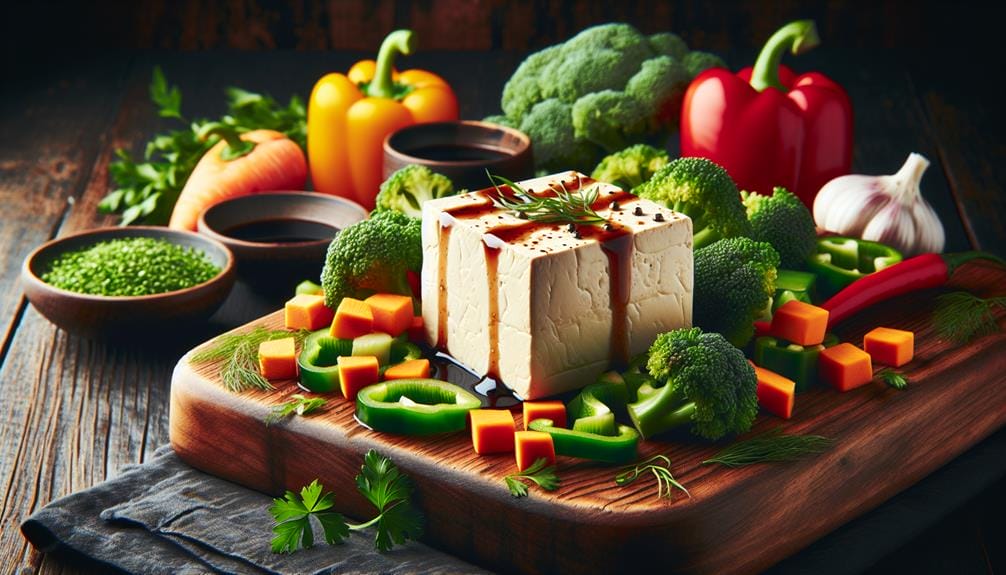
Tofu, a versatile and protein-rich food made from soybeans, is a staple in many vegan diets. Packed with plant-based protein and essential amino acids, tofu is a fantastic meat substitute. It promotes heart health, thanks to its low calorie and cholesterol content.
Here's why tofu rocks:
- Multiple textures: Silken, soft, firm, and extra firm — there's a tofu for every dish.
- Nutrient-packed: Besides protein, it boasts iron and calcium.
- Cooking chameleon: Marinate, grill, stir-fry, or blend it into smoothies.
- Weight management: Low in calories, high in satisfaction.
With tofu, you're not just consuming, you're engaging in a culinary adventure that's as good for your heart as it's for your taste buds.
Nuts and Seeds
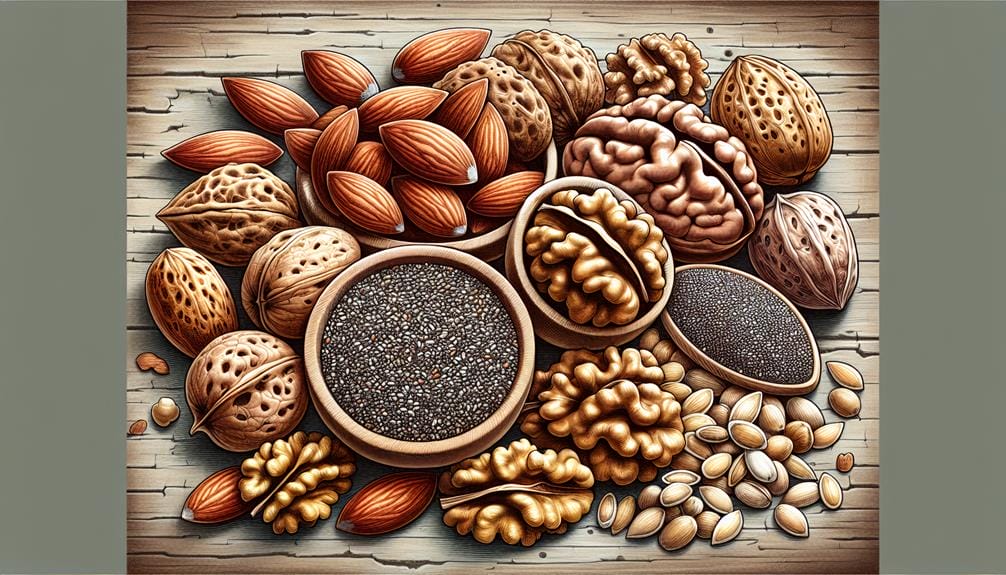
Nuts and seeds aren't just tasty—they're powerhouse sources of protein that can easily be added to your diet. Whether you're munching on almonds, walnuts, or cashews, you're getting a solid 4.5-9 grams of plant protein per serving.
Feeling fancy? Toss some hemp seeds or chia seeds into your smoothie for an extra protein punch. Hemp seeds, in particular, pack up to 9.5 grams of protein in just three tablespoons!
Nut butters like almond butter aren't only delicious but also versatile, offering around 8 grams of protein per two tablespoons. Just keep an eye on those labels—no one needs extra oils and sugars sneaking in.
Chia Seeds
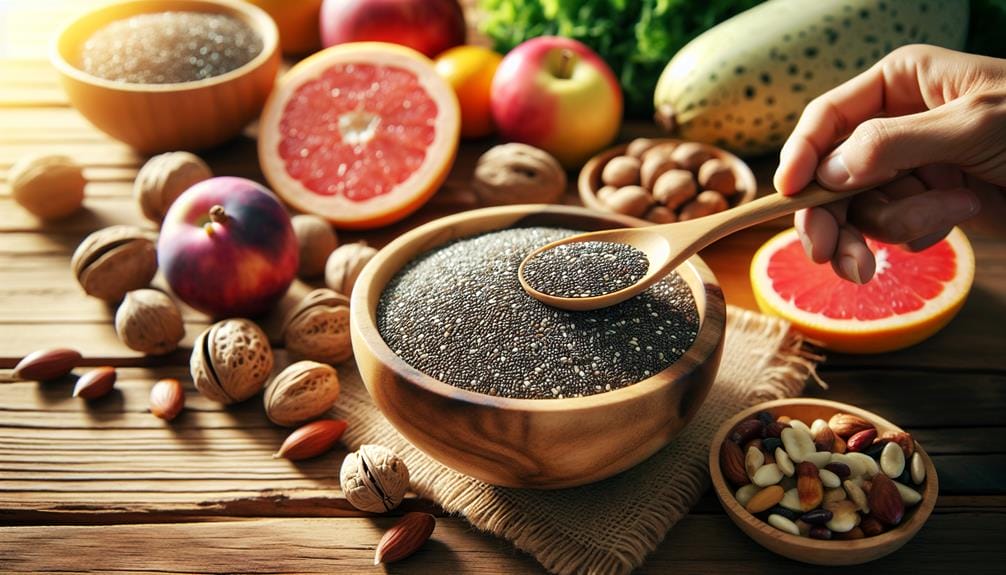
Chia seeds, another excellent source of plant-based protein, offer around 6 grams of protein per ounce and bring a host of other nutritional benefits to your diet. These tiny powerhouses don't just stop at protein; they come packed with omega-3 fatty acids, fiber, antioxidants, calcium, magnesium, and phosphorus.
So, if you're looking for a way to up your nutrient game without breaking a sweat, chia seeds are your new best friends.
- Omega-3 fatty acids: Boost your brain and heart health.
- Fiber: Keep your digestive system running smoothly.
- Antioxidants: Fight off those pesky free radicals.
- Calcium, magnesium, and phosphorus: Strengthen your bones like a superhero.
Trust us, your body will thank you!
Buckwheat
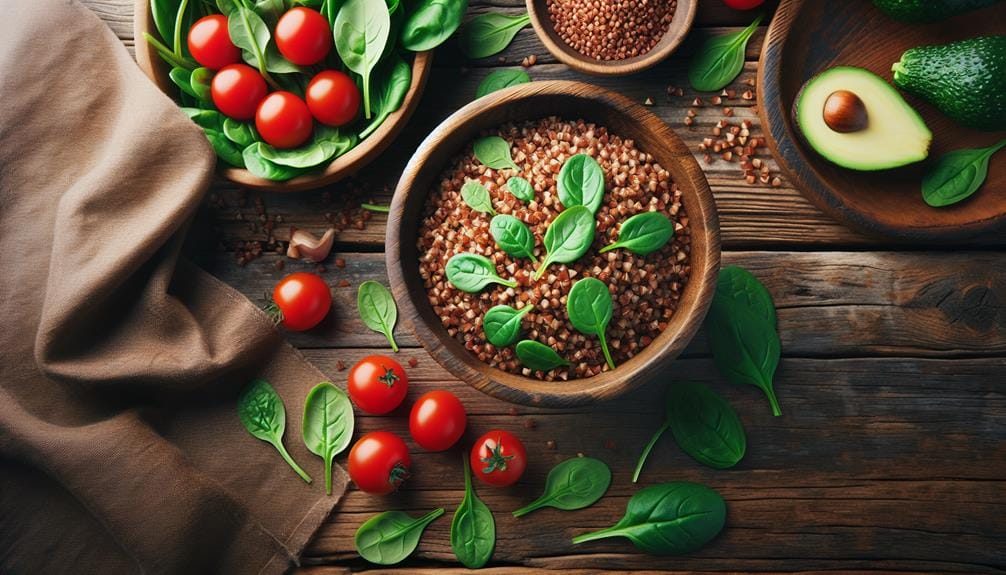
Buckwheat is a nutrient-rich pseudocereal that offers a complete protein source, making it an excellent choice for vegans.
You can enjoy its versatility in various dishes, from salads to soups and even baked goods.
Packed with fiber, antioxidants, and essential minerals, buckwheat supports heart health and aids digestion.
Nutrient-Rich Pseudocereal
Packed with essential amino acids, this nutrient-rich pseudocereal is a powerhouse of gluten-free protein, delivering about 13.3 grams per 100 grams. Buckwheat isn't just another pretty face in the vegan diet world. It's got it all: high protein, fiber, minerals, and antioxidants. You're basically inviting a superhero to your meal plan when you include buckwheat. Seriously, Popeye's spinach has nothing on this.
- High in Fiber: Keeps things moving smoothly, if you catch my drift.
- Rich in Minerals: Think magnesium and iron, your bones and blood will thank you.
- Packed with Antioxidants: Fighting off those pesky free radicals like a boss.
- Gluten-Free: Suitable for everyone, even your gluten-shy friends.
Versatile Cooking Options
You'll find endless possibilities when it comes to cooking with buckwheat, from hearty breakfast porridges to invigorating salads. It's one of those vegan protein sources that can transform any meal into a nutrient-dense delight.
Imagine starting your day with a warm bowl of buckwheat porridge, packed with all nine essential amino acids. Yup, it's a complete protein source, ensuring your plant-based diet is balanced and your protein needs are met.
Feeling adventurous? Toss buckwheat into a salad for a crunchy, satisfying twist. You'll be amazed at how its versatility can elevate your dishes.
Whether you're aiming for a balanced diet or just something delicious, buckwheat's got your back—and your taste buds!
Oats
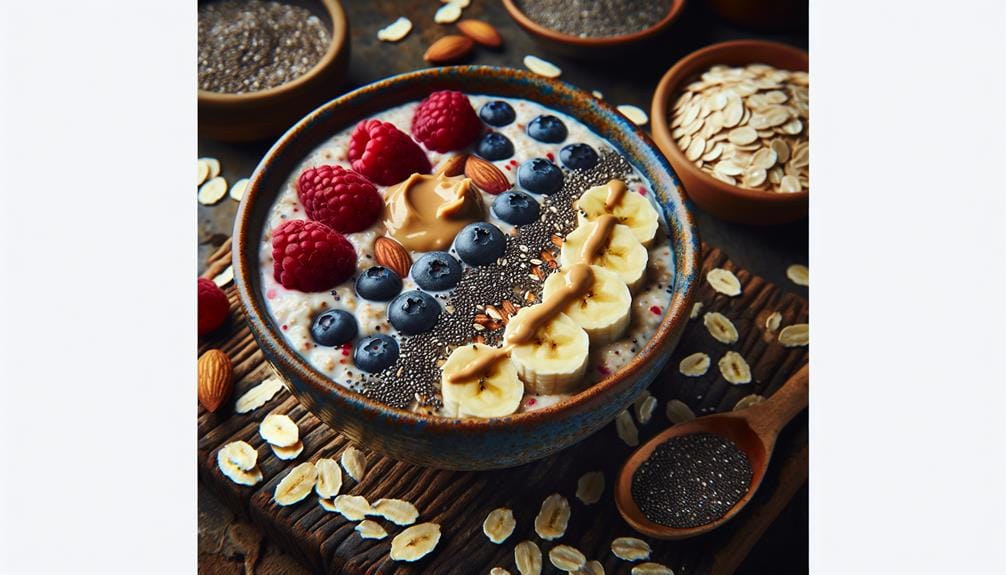
Oats stand out as a nutritious and versatile whole grain, delivering around 6g of protein per cooked cup. You're not just getting protein; oats are packed with fiber, iron, and antioxidants, making them a superhero for heart health and digestion.
Those beta-glucans? They're like little cholesterol-fighting ninjas. Here's why oats should be your BFF:
- Protein Powerhouse: You'll get a solid protein boost.
- Fiber Fantastic: Keeps your digestion on track.
- Iron Infusion: Helps keep your energy levels up.
- Antioxidant Army: Fights off those pesky free radicals.
Whether you whip up some oatmeal, throw them in a smoothie, or get fancy with overnight oats, you're in for a tasty, health-boosting treat!
Rice Varieties
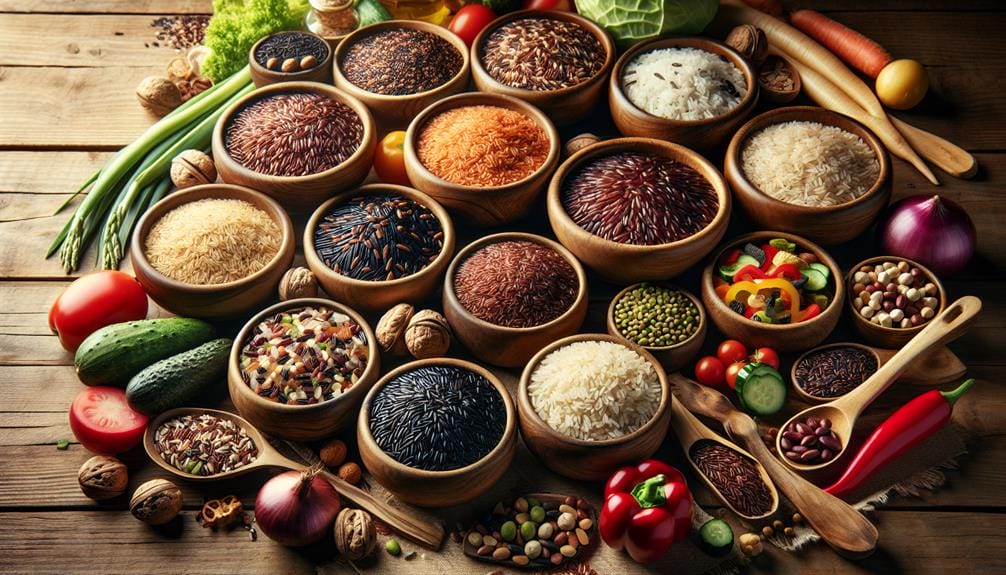
When exploring vegan protein sources, rice varieties like brown, wild, black, red, and basmati offer diverse and nutritious options. Who knew rice could be so complex?
Brown rice packs a solid 5 grams of protein per cooked cup—an overachiever in the rice family.
Wild rice, the wild child, doesn't disappoint with around 6.5 grams of protein per cooked cup.
Black rice, also known as forbidden rice (ooh, mysterious), adds 5 grams of protein per cooked cup.
Red rice, the slightly rebellious sibling, contributes approximately 5.5 grams of protein per cooked cup.
Finally, basmati rice, the smooth talker, brings about 4.25 grams of protein per cooked cup to the table.
Vegetables
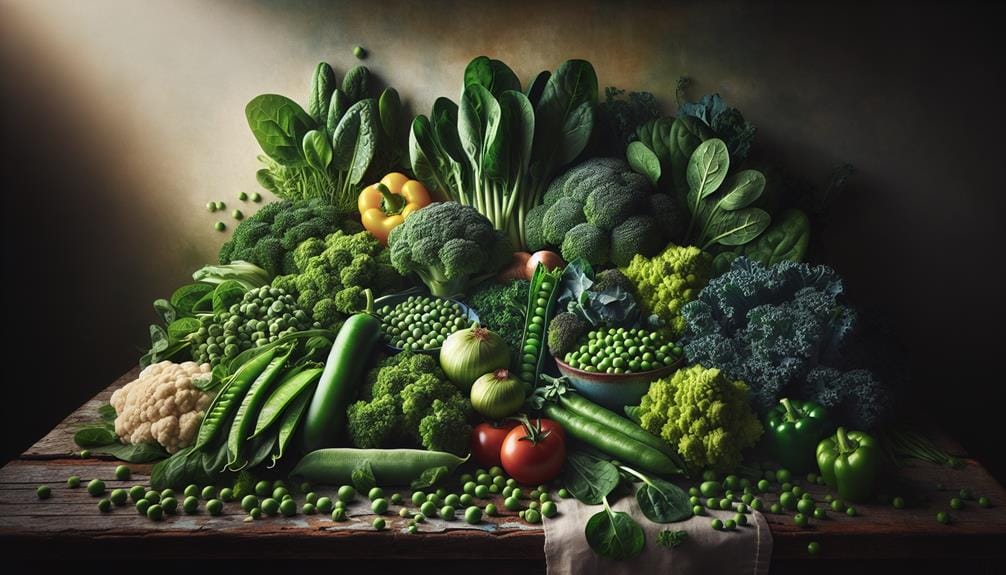
Vegetables frequently serve as excellent sources of protein and essential nutrients in a vegan diet. You might think veggies are just the boring sidekick, but they're actually protein-packed superheroes!
Spinach, broccoli, Brussels sprouts, and artichokes are all stars in the protein department. And don't forget about those other green wonders like asparagus and green peas – they're packing some serious protein punch too. Even cauliflower can flex its muscles in your diet.
- Spinach: It's not just for Popeye!
- Broccoli: Mini trees that boost your protein intake.
- Brussels Sprouts: Tiny cabbages, big on protein.
- Artichokes: The fancy veg with secret protein powers.
Soy Products
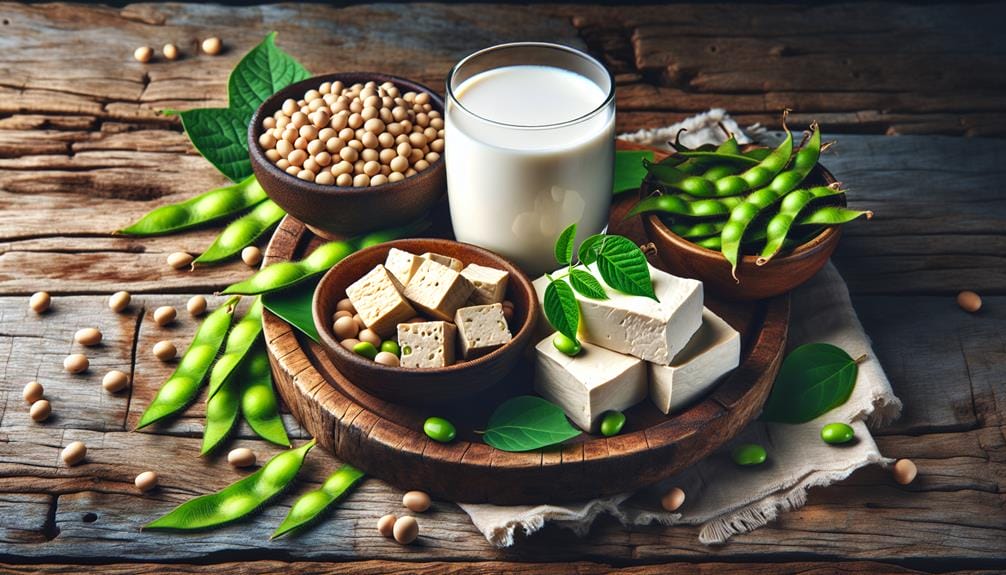
While vegetables bring a lot of protein to the table, soy products like tempeh, tofu, and edamame are powerhouse sources that can boost your vegan protein game even further.
Tempeh, with its 16.9 to 21.8g of protein per half-cup, is like the superhero of plant-based protein.
Tofu, offering 9g per 3-ounce serving, easily sneaks into any recipe, making it a versatile friend.
And let's not forget edamame, the nutritious snacking champion, packing 13.5g of protein per cup.
These soy products are rich in essential amino acids, helping you build muscle and repair tissues. Including these in your vegan diet guarantees you get a variety of nutrients while keeping your protein levels up.
Nutritional Yeast
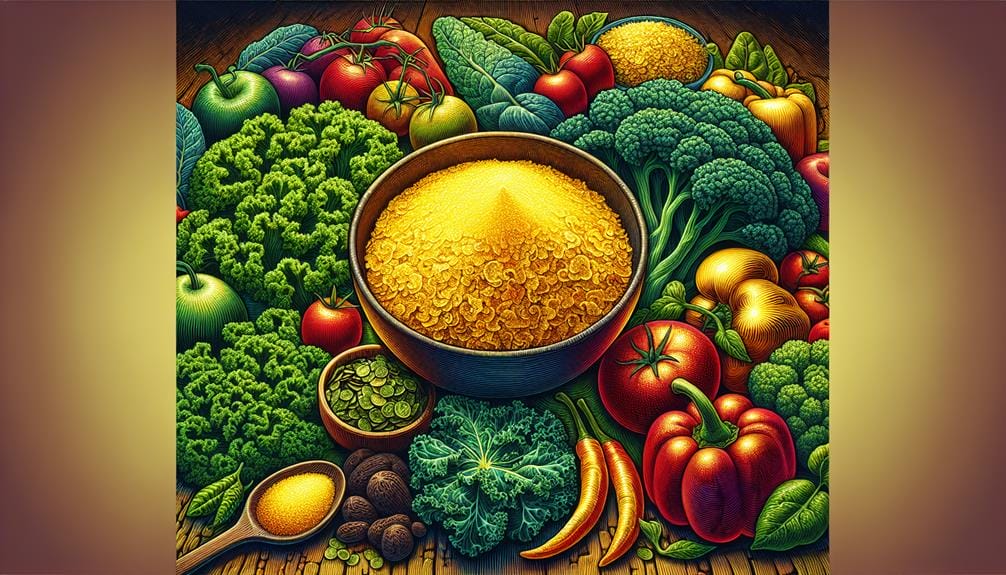
Nutritional yeast, a powerhouse ingredient, offers around 8 grams of protein per serving, making it a fantastic addition to your vegan diet. This cheesy-flavored marvel isn't just delicious; it's also a complete protein, packing all nine essential amino acids.
Plus, it's a brilliant source of vitamin B12, often elusive in plant-based diets. Sprinkle it on your pasta, popcorn, or salads to jazz up your meals and boost your nutrition.
- Complete protein (yes, all nine essential amino acids!).
- Rich in vitamin B12 (no more B12 deficiency worries).
- Cheesy flavor (without the cheese guilt).
- Versatile (pasta, popcorn, salads—your call!).
Incorporating nutritional yeast into your vegan diet ensures you're receiving a balanced mix of essential nutrients.
Conclusion
To wrap things up, incorporating vegan protein sources like quinoa, pulses, tofu, various rice types, vegetables, soy products, and nutritional yeast into your diet guarantees you meet your daily protein requirements.
Don't underestimate the power of plants; they're the unsung heroes of nutrition. By diversifying your meals with these protein-packed options, you'll build a balanced diet that fuels your body efficiently.
So, take the reins of your nutrition and harness the benefits of these vegan powerhouses.
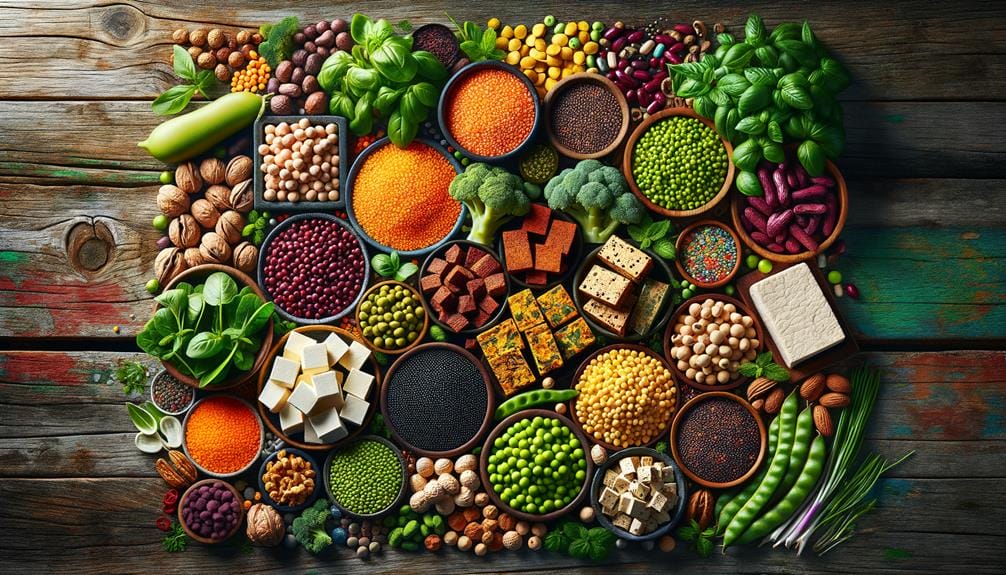
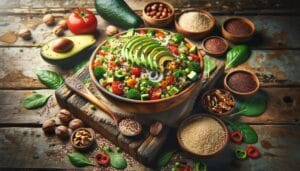
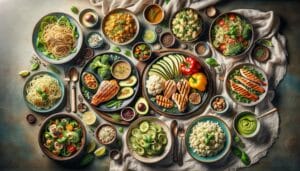
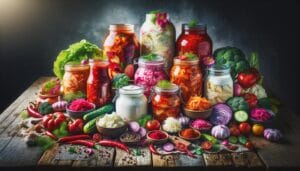
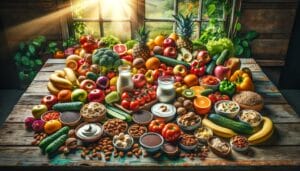
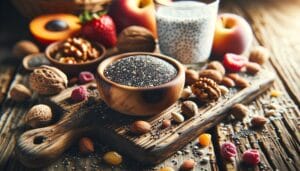



Leave a Comment